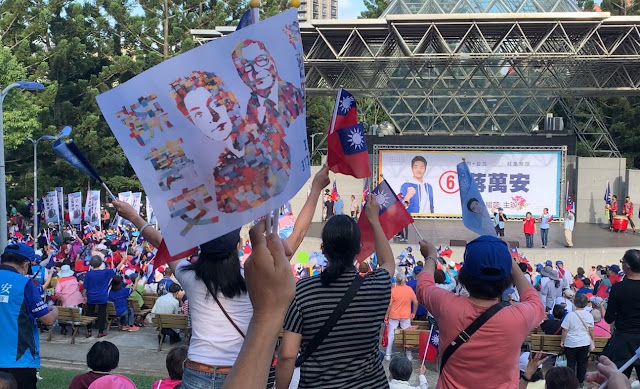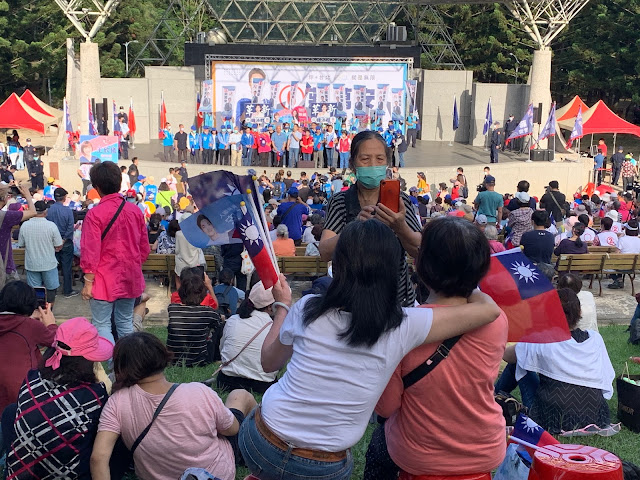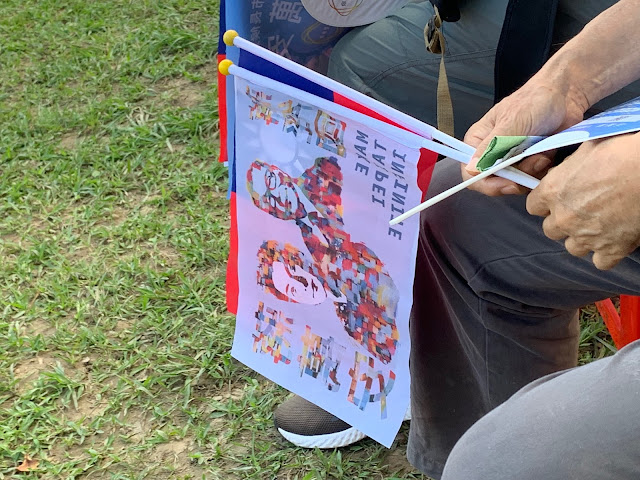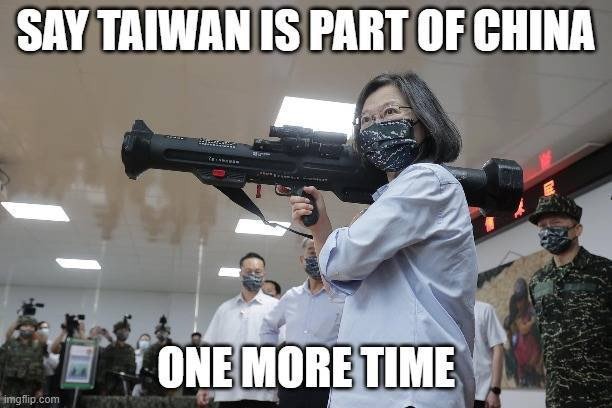
Past support for these jerks is not the same as support for "Taiwan independence"
More often than seems reasonable, in political discussions I see some variation of this take far too frequently. Recently, a version of it came from someone who claims to teach “East Asian History” — that is, someone who should know what they’re talking about. To paraphrase:
Taiwan is a part of China. The idea of Taiwanese identity or nationalism is a farce created by the United States in order to drive a wedge between themselves and China, for their own interests in keeping tensions high. They backed the KMT, who were corrupt narco-running gangsters at best, and set up that whole “Nationalist” idea on Taiwan as a thorn in China’s side.
Maybe there was some blah blah forever war blah blah Raytheon stuff in there, or perhaps some junk about the US funding Taiwan’s “color revolution” splittists; I don’t care to remember. Most of this subtype seems to think the US "gives" Taiwan weapons (it doesn't -- Taiwan buys them) or that the US sends aid to Taiwan (wrong again -- the aid ended in the 1960s).
Crucially, both of these strains of thought assume that “Taiwanese independence” or “Taiwanese [ethno] nationalism” was either created, supported or funded by the United States of America.
Although regular readers will already know why this view of Taiwanese national identity is wrong, someone needs to talk about it in English in a clear way and historical perspective, as these takes love to reference history: usually something about how the horrible Nationalists were backed by the US and that’s the seat of everything.
So, let’s go backward in time, stopping at scenic historical overlooks to discuss why this view is simply, plainly, clearly not true.
I'm not going to go chronologically here; let's start with the era such people reference most frequently: the KMT occupation of Taiwan and subsequent rivalry with the CCP.
The 1949 Question
A shallow reading of history might lead a dilettante type to think that both the KMT and CCP wanted Taiwan, that they'd both historically believed Taiwan was an inalienable part of China, and that with US assistance the KMT was able to retreat to Taiwan where the US-led Western order supported them simply because they hated and feared communism and wanted to keep Taiwan out of the hands of the CCP for their own selfish reasons.
After all, the Allies said yes to Chiang Kai-shek's desire to take Taiwan in Cairo, and allowed the KMT to occupy Taiwan in 1945. In the early 1950s, they agreed to financial and military support of Taiwan (or at least, to Taiwan as a site for US military bases). If you just ignore a few years in the middle (say, approximately 1947 to 1952) and assume that support was unwavering, it might look a bit damning, and certainly the US has historically acted in its own self-interest, as all nations do.
But it's just not true that the US unequivocally supported the KMT. That period of history is complex and can't be covered in one section of a blog post -- entire books have been written about it. It's well-known that Truman didn't care for Chiang Kai-shek, and while he disliked Mao and the CCP, he wasn't much of a fan of the KMT, either. Some of his advisors advocated for defending Taiwan, but plenty also said that the KMT were not worth funding. For several years, the US seemed just as willing to let the PRC take Taiwan as help the KMT hold it. Talk of some sort of international trusteeship for Taiwan was probably destined to go nowhere, but there was indeed talk. The US knew of at least one coup plotted against Chiang and did nothing.
Yes, the US stance eventually changed, but that it had to change means there had been a different stance to change from; they had not always been strong supporters of the Nationalists on Taiwan.
I can hear my own readers screaming, so here's the bigger problem with this line of thinking: support for the KMT is not the same as support for Taiwan independence.
I honestly can't believe I have to clarify that, but it seems necessary.
It's easy for someone who has spent zero time actually watching Taiwanese politics think the KMT opposes the CCP, Taiwan opposes China, and the KMT founded the government on Taiwan. The US helped them, and therefore "Taiwan independence" must be the same as that KMT-CCP rivalry in which the US clearly supports the KMT "independence" side.
Let me tell you, from inside Taiwan, that sounds absolutely bonkers.
The KMT has believed since around 1943 that Taiwan is a part of China; on this, the KMT and CCP actually agree. The KMT rejiggered an entire educational system to drive home this point and push Chinese identity on Taiwanese people. Not Taiwanese identity, Chinese. They refused to compete in the Olympics as Taiwan (rather than the Republic of China). Although the US tried to propose a seat for Taiwan as Taiwan -- not the ROC -- at the United Nations, Chiang Kai-shek would not have accepted it. (This is a shame, as the UN resolution that allowed the PRC to join as "China" did not explicitly block Taiwan; theoretically, there is nothing save China's recalcitrance barring Taiwan from joining as itself.)
The KMT attempted to render the Taiwanese language extinct, banned just about any media that might cause Taiwanese to think their cultural homeland might be Taiwan, not China, and continues to push One China narratives on Taiwan regardless of how outdated they are. Their vision is consistent only in the respect that they are oriented towards China, not Taiwan.
Time and time again, when given the opportunity for formal recognition as Taiwan, the KMT rejected it under the belief that they were the sole legitimate government of China.
Even when they talk about fighting for democracy, they point to events that happened in China, not Taiwan:
Decades of KMT dictatorship saw Taiwanese independence activists surveilled, jailed, tortured and murdered. Anyone who so much as called for a recognition of Taiwanese identity or pushed for democratization on Taiwan was subjected to this; for two generations, the biggest opposition to Taiwanese self-rule was the KMT. From 1947 until the early 1990s (when the imprisonment of political dissidents ended), the KMT systematically hunted and brutalized anyone who even breathed the idea of Taiwanese independence.
You know, that party the US supported during many of those same decades.
How does it make any sense at all that the US "support of the KMT" had anything to do with them creating a "Taiwan independence" movement? They quite literally supported the oppressors of that same movement! They bankrolled the guys who murdered pro-Taiwan activists!
And yet, I still hear it. Occasionally, the person spouting this nonsense seems to think ardent supporters of Taiwanese sovereignty -- myself included -- must therefore support the KMT. Some think it's imperative to tell us how awful the KMT actually are.
Do they not think we already know? Insulting those corrupt gangster colonizers isn't a searing indictment of the Taiwan independence movement. It's quite literally the opposite.
This dynamic hasn't changed much since democratization.
The US and Democratic Taiwan
Remember in the early 2000s, when an unabashedly pro-Taiwan president was elected, the first from the "opposition" DPP, and the US political establishment didn't seem especially enthused? Then, do you remember when they seemed to be more generally supportive of the election of pro-China KMT candidate Ma Ying-jeou eight years later?
Does a distant relationship with pro-Taiwan Chen and tacit endorsement of pro-China Ma sound like the tactic of a country trying to foment a 'color revolution' of furious 'splittists'? (No.)
I'd like to take a little side road here: it's unclear exactly how much balking Chen actually engendered. It was once a widely-spread rumor (in some circles) that US officials had labeled him a 'troublemaker', but I can't find much evidence that this actually happened. President Bush was said to have used the term, but apparently that's wholly apocryphal. Those who say it did point to 'some' officials, but never state who those officials are or the circumstances of it happening. No details, just 'some people said'. That's hardly concrete.
China sure seemed invested in touting Chen as a 'troublemaker' and seemed all too happy to get the US in on this, but it doesn't seem to me that they took the bait. Ma Ying-jeou himself said he wouldn't be a 'troublemaker' like Chen, but then Ma was always influenced by whatever the CCP wanted from him -- of course he'd repeat a rumor like that. So, I have some ideas about the origins and truthfulness of this "Chen is a troublemaker" story.
It's true that the US seemed to warm up to Tsai quite a bit -- the spate of pro-Taiwan legislation and visits to Taiwan by high-level US officials during the Tsai administration at least indicate as much.
That said, the shiny new AIT complex in Neihu broke ground under the Ma administration in 2009, meaning it was probably planned in the waning Chen years, and opened under Tsai. To me, that shows a US commitment not to any given vision of Taiwan's future -- independence included -- but to the US-Taiwan relationship.
Now that we're back on the main highway, let's kick it forward a bit. It's true that there's been an uptick in supportive rhetoric on Taiwan by the US, with President Biden calling the US's commitment to Taiwan "rock solid" (among other things).
However, as with the Bush debacle in the early 2000s, these kind words for Taiwan always seem to come with a chaser: "the US doesn't support Taiwan independence".
What they mean by this is that they don't support Taiwan unilaterally declaring independence, as the Taiwan Relations Act (and the bevy of assurances and communiqués accompanying it) clearly state US support for a peaceful, bilateral resolution. It does not mean that Taiwan independence can never happen, or that the US believes Taiwan is not currently autonomous (they clearly do, if they're selling Taiwan weapons, upgrading unofficial relations and calling their commitment "rock solid").
I may not personally be the biggest fan of this particular bilateralism -- I think Taiwan has every right to tell the CCP to eat dirt -- but that's what the policy says, and the US has been consistent in that regard. Even when it sounds like Joe Biden is going "off-script", everything he says can indeed be interpreted within that framework.
Again, does this sound like a country that is arming rebel militias in Taiwan with the purpose of stoking separatist sentiment? (No.)
Frankly, it sounds like a country that is warm toward the current administration and Taiwan in general, but historically has supported stances oriented towards Taiwan being part of China, not separate from it.
I've even heard the absurd claim that the US is "funding" Taiwan independence through all the weapons they "give" and foreign aid they "send" to Taiwan.
Let me repeat: the US does not give Taiwan offensive weapons. They sell defensive weapons meant for the military of the Republic of China, not roving bands of guerillas. I don't buy into the idea that the Republic of China still claims "all of China" (it doesn't), but the ROC government is simply not the same as Taiwan independence activists, or "color revolutionists", or "separatists", or whatever you want to call them.
And once again, Taiwan does not receive foreign aid from the US, and has not done so since 1965. The US isn't funding "Taiwan independence" because it's not funding anything in Taiwan. I am sure plenty of people will insist it must all be very covert, but if that's the case I know a lot of activists who'd love more information about all this money they're supposedly making, because if that's happening, nobody on the Taiwan side has heard about it!
The origins of Taiwanese Identity
A lot of people also make the fundamental mistake of believing that the Taiwan independence movement is only as old as the Republic of China on Taiwan. Therefore, the two must be linked somehow. Memorably, I've even seen reference to 228 as the "birth" of Taiwanese identity.
Certainly, the 228 Massacre was a pivotal moment. In terms of the modern movement, it could be seen as a birthday of sorts -- perhaps a milestone one rather than an origin point, however.
And if we're talking about US creation or support of Taiwanese independence, those origins matter.
In Transitions to Modernity in Taiwan, Niki Alsford points out that not much research has been done on the generation preceding the pro-Taiwan generation of the 1920s. Kerr’s Licensed Revolution and the Home Rule Movement speaks in broad strokes about Taiwanese identity and the lack of desire for either Qing or Japanese rule from afar, especially among Indigenous Taiwanese. (And why shouldn’t they have been uninterested in the claims of these colonial powers? By all rights, they were in Taiwan first.) However, he crucially notes that the average person -- of Chinese descent or not -- preferred both empires to just leave Taiwan alone. The main thing they seemed to want was good governance.
Consider the Qing-era epithet that Taiwan “has a rebellion every three years and a revolt every five” — restive even by Chinese standards. Reflect as well that the Qing themselves viewed Taiwan as something ‘other’, an ‘Island of Women’, a defensive barrier to the ‘real’ China but otherwise a “ball of mud beyond civilization”, not any intrinsic part of China worth caring about. Emma Jinhua Teng lays this out beautifully in Taiwan’s Imagined Geography. Given those conditions, it makes sense that after a few generations, the families settling in Taiwan from China — who tended to be poor and seeking a better life — would cultivate a sense of distinct identity tied to the island.
But to what extent? I don’t know. It was enough that when the Qing ceded Taiwan to Japan, those who fought back, and declared a (short-lived) Republic of Formosa, included language in their plans that referenced government coming from the people, not issued from far-away officials. Yes, that republic claimed fealty to the Qing, and the leaders mostly fled to China when defeat seemed inevitable (and sometimes before). The way they talked about it though? It’s not so simple to say they just wanted to be returned to the Qing. They were after some sort of home rule, too.
Why am I telling you all this? Think about it: if this is an origin point of Taiwanese identity and the fight for Taiwanese sovereignty — unclear, problematic and fraught as it is — how on earth do you think the US funded it, let alone “created” it?
And frankly, why would they care to? They were still dealing with the Qing and Taiwan was about to be handed to Japan. What would the rationale have been to stoke 'separatism' as a weapon against China? Notably, while a former US Secretary of State got involved in the Treaty of Shimonoseki, which handed Taiwan to Japan in 1895, notably the Tripartite Intervention that sought to influence the treaty in Western powers’ favor were Russia, France and Germany.
If this era indeed provided the seeds that later blossomed into the pro-Taiwan, local identity, nativist, independence and democratization movements, it's simply inconceivable that the whole thing is simply a fever dream of the United States, not a real and long-lasting movement that has always been intrinsically Taiwanese.
In fact, to deny this history in favor of a jejune "everything I don't like is funded by the CIA" is to westsplain the hell out of Taiwanese history. Do these people think Taiwanese have no agency? Do they think only Westerners do? Do they think Taiwanese people are stupid, or easily manipulated, or incapable of forming their own ideas about history and identity without some evil Big Brother from across the sea tempting them with poison candy?
Come on. "It's the evil CIA! The US is funding Taiwan separatism to destabilize China!" may seem on the surface like a social-justice oriented take in which the West is bad and China can do no wrong, but at the end of the day it's just racism.
The Home Rule Movement in Japanese-Era Taiwan
Skip ahead to the 1920s, with Taiwan now an established colony of Japan. A complex web of cultural and home rule associations sprung up, many of them started by Taiwanese students in Japan inspired by modern political ideas they were exposed to there (in fact, some circumvented the Taiwanese colonial government completely and went straight to the Japanese national government).
I could write an entire blog post just on the New Culture Association (inspired by China’s May Fourth Movement but promoting Taiwanese cultural and identity-related arts and literature), the annual petition to the parliament, the Home Rule Association, the Taiwan People’s Party, Formosa Youth Magazine, and thinkers like Lin Hsieh-tang, Chiang Wei-shui, Tsai Pei-huo and (noted communist) Hsieh Hsueh-hung.
But the short of it is that, within the strictures of the colonial government — which tolerated their activities at times, but surveilled and arrested them at others — these early thinkers promoted not just home rule (see Kerr again for a firsthand account of their work) but Taiwanese culture through the arts. Lien Heng — interestingly enough, the grandfather of Chinese ultranationalist Lien Chan — wrote the General History of Taiwan and was also involved in promoting Taiwan as a unique cultural entity with a distinctive history worth understanding in its own right, separate from China.
We can argue about 1895 all day, but these Japanese-era movements for greater home rule and recognition of local culture are essentially indisputable. Sometimes their supporters got tangled up in KMT politics (often to their regret), but at the end, it’s clear what they stood for.
This link is made explicit in the music and literary history: the magazines these groups produced are held up as a historical reminder that Taiwanese were talking about Taiwaneseness when Japan was trying to make Taiwan more Japanese — well before the KMT came to town. The music, too. A lot of that era’s music was banned under Martial Law, sometimes just because it was in Taiwanese even if the lyrics were not remotely subversive.
What’s the best way to turn something into a symbolic anthem for pro-democracy fighters? Get the authoritarian regime they’re fighting to ban it!
Now, dig deep. Do you really, honestly think that when Japan ruled Taiwan, the US was skulking nefariously behind the scenes, training and paying the prominent figures of the era to promote “Taiwanese nationalism”...to stoke a rivalry with China? In an era when China didn’t even consider Taiwan to be Chinese, and it was assumed it would be Japanese in perpetuity? (And they did -- Sun Yat-sen visited Taiwan twice and at no point mentioned any sort of belief that it was part of China. The early CCP, as well, considered Taiwan a separate entity.)
How does that make even a lick of sense? Even if the US were capable of hurting China in this way in the 1920s -- which they were not, because Taiwan was part of Japan! -- why would they want to?
I'm skipping the Indigenous uprisings against the Japanese here because frankly, I think events like the Musha incident do tend to get swiped and used for every narrative other than the ones Indigenous people want to tell. The independence activists want to paint it as Indigenous solidarity. The KMTers want to make it look like they had similar sentiments to brave ROC soldiers. I don't love that, and don't want to join the grabby-grabs, so I'll just point out that Taiwanese of all kinds fought for home rule as they saw fit, and these causes have origins that far pre-date any KMT or US presence on Taiwan.
In Conclusion, You Don't Make Sense
I mean, I get it. I get the desire to blame everything on the US. It kinda, sorta, if you look at it through a kaleidoscope, seems like you're standing up for the rest of the world by doing so. I get the hatred of the Nationalists -- I hate them too. What I don't understand is the distorted interpretation of history in which all Taiwanese would want to be Chinese if not for the Big Bad United States.
It just doesn't make sense. There wasn't that much enthusiasm for the Qing, uprisings continued well into the Japanese era, and the KMT were absolutely not supporters of "Taiwan independence", to the point that it's offensive to imply they were. If the US funded or aided anyone in all these centuries of Taiwanese history, it was the KMT -- the brutalizers of those who fought for Taiwan in the 20th century and continue to crap on Taiwanese independence.
Regardless, the idea of a distinct Taiwanese identity and the notion of 'home rule' all pre-date any era in which US involvement in stoking Taiwan "independence sentiment" or some sort of invented rivalry with China would have made a lick of sense.
Today, this belief that "everything I don't like is the CIA's fault" just looks bad. If you assume that this is a sort of splittist/color revolution thing, you have to assume as well that it's a view held by bands of violent, passionate "separatists" willing to, I dunno, Molotov their own government to get what they want.
But that's not the case. Most Taiwanese identify as solely Taiwanese, most don't want Taiwan to be a part of China in any sense, and most view the current status quo as sufficient qualification to consider Taiwan independent. I don't think there's enough money in the world to control public opinion that tightly, after decades of KMT-dictated schooling in which Taiwanese were instructed to accept that they were Chinese.
Even if it were possible, it's simply a racist take to assume it's true. People have agency. Not just the US or China, or the groups you do like, but even the ones you don't support. Taiwanese people are not jarheads just walking around with their thumbs up their asses waiting for someone else to tell them who they are. Quite the opposite, a point which has been proven over and over and over again with every iteration of the long battle for identity and recognition.
So maybe, just maybe, all you "it's the CIA!" folks could sit down, shut up, and examine how unrelentingly racist your take sounds.


















